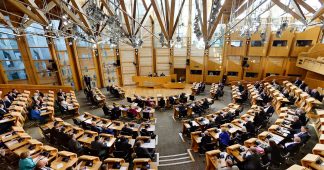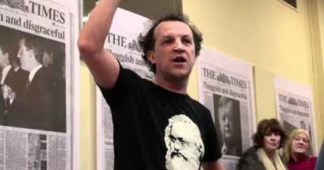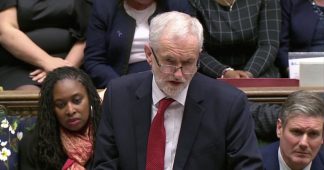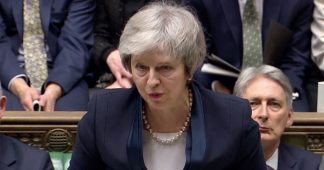The Scottish struggle for independence is one of several issues at the centre of debates over where power in the United Kingdom should be located, writes Isobel Lindsey
December 4, 2019
Illustration by Hey Monkey Riot (Edd Baldry)
The latest polls suggest support for Scottish independence is now around 50 per cent with opponents disproportionately represented among the old and higher income groups. Most radical opinion is firmly in the Yes camp. Ireland is on the road to unification. Brexit will help this along, as will demographic trends and increasing cross-border interaction. Wales is also stirring.
That leaves the English problem. This needs the most intellectual input, when considering the future of the UK and where power should be located, because there has been a failure to produce, debate and campaign around a vision for new systems of democratic governance for England. This includes the issue of the geographical, as well as the social, distribution of economic activity and wealth, which is heavily concentrated in the most prosperous parts of the south east. There has been no serious policy to address this problem in mainstream politics apart from sloganising about a ‘Northern Powerhouse’ and some over-publicised central government handouts.
The F word
Before looking at the English options, we need to talk about the F word. Federalism is seldom raised in UK-level politics. It does get the occasional mention in Scotland, but even there usually as a ‘get-out’ by those opposing independence but wanting to appear progressive.
There are two basic models that could apply to the UK. One would be a four-nation model with a directly-elected English assembly as in Scotland, Wales and Northern Ireland. A UK-wide federal parliament would retain responsibility for some or all of defence, foreign affairs, monetary and much fiscal policy, trade and industry, and so on. It could be elected by either population share or equal state representation like the US senate. Either option would pose problems as England has 84 per cent of the population.
The second model would be three nations plus English regional legislatures. This would offer a different dynamic but these would have to be real legislatures, not just some upper tier of local government, or it would be little different from the present system.
There is another crucial factor for Scotland. We see independence as an opportunity to develop a very different approach to the powers currently held at Westminster and that would continue at UK federal level. For example, the UK’s Trident nuclear arsenal is currently based in Scotland. But an independent Scottish parliament would be likely to require their immediate decommissioning and removal. On international affairs, EU membership, immigration and economic policy, too, there is an appetite to pursue different paths from those of past Tory and Labour governments. It would be difficult to accommodate such differences in any federal arrangement.
This does not mean that independence for Scotland (or Wales, or Irish unification) would preclude the development of cooperative institutional structures. The British-Irish Council, for example, was established in 1999 to encourage dialogue and practical cooperation between the UK, Ireland, Northern Ireland, Scotland, Wales, Isle of Man, Guernsey and Jersey (note the absence of England other than through the UK government). There is a permanent secretariat, twice-yearly summits and regular inter-governmental consultations. This is the kind of institution with potential for greater development.
Unanswered question
Whatever route Scotland, Wales and Ireland take, there would still be an unanswered English question. Dealing with that has to include the meaningful devolution of power and addressing the culture and accountability of Westminster/Whitehall. Expecting the Westminster-focused political parties to initiate a serious reform programme without a popular campaign behind it is highly unlikely. So how do you start to build an imagined future and the aspiration to achieve it?
There are some precedents. There were a number of regional campaign organisations in England from the late 1980s onwards, of which the Campaign for a Northern Assembly was the most active, as well as the Welsh and Scottish campaigns. These all had political party and some civic group participation but were driven primarily by individual campaigners.
Scottish campaign
In Scotland, we took this a stage further. The Campaign for a Scottish Parliament arose out of the mess of the 1970s, when a reluctant Whitehall was pushed by the Labour government, under electoral threat from the SNP, to produce devolution proposals for Scotland. There were supporters among MPs of all parties (including the Tories) but hostile backbenchers undermined an already weak devolution scheme. A small majority backed devolution in a referendum but it failed to meet the required threshold of 40 per cent of the electorate.
In establishing the cross-party Scottish campaign in the late 1980s, we were focused on getting broad agreement in Scotland on a detailed Scottish Parliament model and not leaving the substance to Whitehall and Westminster. We set up a constitutional steering committee with a small number of respected figures from public life in Scotland but not political party representatives.
Its task was to prepare proposals for a Scottish constitutional convention. The starting point of its report, A Claim of Right for Scotland, published in 1988, was a declaration of principle: the ‘claim of right’. There were two previous such claims, in 1689 and 1842. Each had echoes of the declaration of independence in 1320, when senior nobility and clergy seeking the pope’s support for Robert the Bruce as king wrote: ‘If he betrays trust, we would choose another king.’ There is a consistent theme here rejecting the idea of ultimate sovereignty resting with the crown and insisting that sovereignty lies with ‘the people’.
The Claim of Right report argued that the right to choose Scotland’s constitutional future rested with the people of Scotland. All Scottish Liberal and Labour MPs, bar one, signed this claim. The legitimacy of a constitutional convention was based on securing the support of elected representatives and civic leaders. The political opportunity came in late 1988 when all Scottish MPs, MEPs, representatives of every local authority, political parties and civic groups were invited to take part. A large majority participated (though the Conservatives and then the SNP later withdrew) and almost every local authority had a representative along with churches, trade unions, small businesses and women’s groups. The outcome, after several years’ work, was substantially the scheme that was turned into legislation after 1997.
English lessons
Are there any lessons in this for what might work for England? Crucially, real decentralisation and democratisation has to recognise geography. Reform of corporate power structures and highly concentrated wealth is essential but so is control where people live, have their homes, schools, hospitals, transport, police and recreation, and where they forge their community identity.
To work, reform has to be driven by local coalitions and to start in the regions where demand is strongest. It needs to initiate debate on specific proposals for serious redistribution of power – otherwise the public is not going to be engaged and inspired. There will be many obstacles from some of those in the leadership of local government. In Scotland they had been very hostile in the 1970s, only becaming key allies after the Thatcher years. Given how badly local government has been treated in the past decade, they also may be interested in change in England.
‘Take back control’ was always a phoney but attractive slogan. It struck a chord with many. In contrast, ‘Take control’ is forward-looking and, who knows, it could turn out to be genuine.
* Isobel Lindsay was a founder of the Campaign for a Scottish Assembly
Published at https://www.redpepper.org.uk/scottish-independence-and-the-england-problem/











